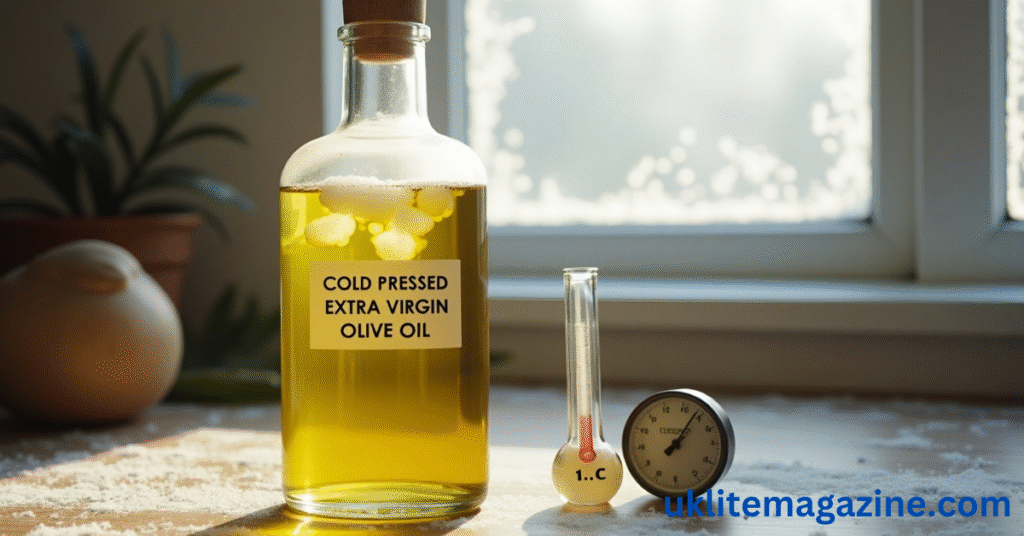Olive oil is a kitchen staple known for its health benefits, rich flavor, and versatility. But during colder months or storage in low temperatures, many people notice something strange — their olive oil thickens or appears cloudy. This leads to the common question: does olive oil freeze? The answer is both simple and fascinating. In this article, we explore the freezing point of olive oil, the effects of freezing on its quality, and how to properly store it.
What Temperature Does Olive Oil Freeze?
Yes, olive oil does freeze, but not in the same way water does. Instead of forming hard ice crystals, it becomes cloudy, thick, and may even solidify depending on the type and temperature.
Freezing Point of Olive Oil
The freezing point of olive oil varies based on its purity and composition. Here’s a quick look:
| Type of Olive Oil | Approx. Freezing Point (°F/°C) |
|---|---|
| Extra Virgin Olive Oil | 30–40°F (-1 to 4°C) |
| Virgin Olive Oil | 32–39°F (0 to 4°C) |
| Refined Olive Oil | 39–50°F (4 to 10°C) |
| Blended Olive Oils | Varies based on blend |
The more pure the olive oil (like extra virgin), the higher its tendency to thicken or freeze at lower temperatures.
Why Does Olive Oil Freeze?
Olive oil is made up of different fatty acids and waxes. When the temperature drops, these components begin to solidify, making the oil look cloudy or gel-like. This is not a sign of spoilage — it’s a natural physical change.
Factors that influence freezing include:
-
Fatty acid profile: Oils with higher monounsaturated fats freeze more easily.
-
Purity and processing: Cold-pressed and unfiltered oils freeze faster than refined ones.
-
Storage temperature: Prolonged exposure to cold speeds up the process.
Is Frozen Olive Oil Still Good?
Absolutely! Freezing does not affect the nutritional value or taste of the oil once it returns to room temperature. However, repeated freezing and thawing can degrade its quality slightly over time.
What Happens When Olive Oil Freezes?
| Change | Is It Harmful? | Explanation |
|---|---|---|
| Cloudiness Appears | No | Natural solidification of waxes and fats |
| Oil Thickens | No | A temporary consistency change |
| White Crystals Form | No | Normal in high-quality olive oils |
| Flavor Changes | Sometimes (with repeated cycles) | Can affect aroma and freshness slightly |
How to Prevent Olive Oil from Freezing
To avoid olive oil freezing, it’s important to store it in the right conditions. Here’s how:
Best Storage Practices
-
Keep at room temperature: Between 57°F and 70°F (14–21°C) is ideal.
-
Avoid refrigeration: It speeds up solidification.
-
Use dark bottles: Protect oil from light which can degrade it.
-
Store in a cool, dry place: A pantry or cupboard away from heat sources is best.
Quick Tips for Prevention
-
Use smaller containers to reduce air exposure.
-
Don’t store olive oil near stoves, windows, or heaters.
-
If it freezes, let it naturally return to room temperature — avoid microwaving or direct heat.
Can Freezing Be Used to Test Olive Oil Purity?
You may have heard the myth that “real” olive oil freezes and fake oil doesn’t. This is not reliable. The freezing point of olive oil depends on many factors, not just purity. Some high-quality oils may not freeze quickly, and some refined oils might.
So, don’t rely on this method to test your oil — instead, buy from trusted brands and check for certifications like “extra virgin” and quality seals.
Conclusion
In short, yes — olive oil does freeze, usually at temperatures around 30–40°F. This natural process is harmless and doesn’t indicate spoilage or poor quality. With proper storage, you can keep your olive oil fresh, flavorful, and ready for cooking all year round. Understanding these physical changes helps avoid unnecessary waste and ensures you get the most out of your kitchen staple.
FAQs About Frozen Olive Oil
Q1: Is cloudy olive oil safe to use?
Yes. Cloudiness is a natural result of freezing and does not affect safety or nutrition.
Q2: Can I put olive oil in the freezer for long-term storage?
You can, but it’s not recommended unless absolutely necessary. Room temperature is best for preserving quality.
Q3: Will heating frozen olive oil damage it?
Not if done gradually. Let it return to room temperature naturally. Avoid microwaves or direct flame.
Q4: How do I know if my olive oil has gone bad?
Spoiled olive oil smells rancid, tastes bitter, and may have a waxy or off texture. Freezing doesn’t cause spoilage, but time and light exposure can.

